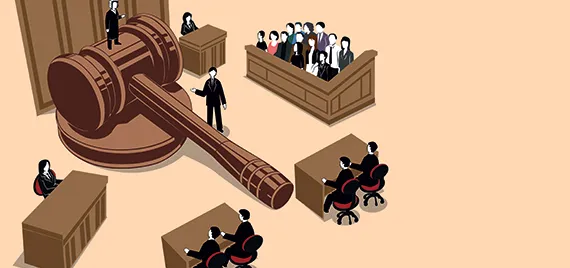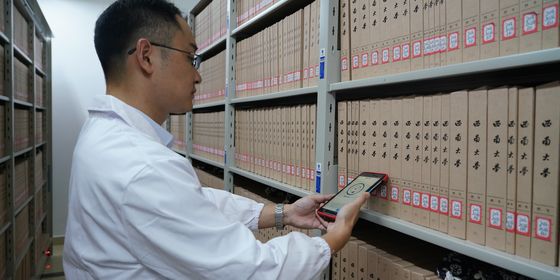Recent legal reforms and how they’re changing the face of China’s judicial system
It was not until 1999 that “rule of law” was formally written into China’s constitution as part of an amendment ratified by the National People’s Congress. More than 15 years later, the term is still a key buzzword in media discussions as the country struggles with the realization of this concept.
One need only glimpse the headlines to see injustices occurring on a daily basis. The sheer size of China’s administrative bodies, collectively serving over a billion people, makes reform a daunting task, not to mention the breakneck pace of development which results in a legal system screaming out for equally rapid change.
This issue we look at a few of the troubles plaguing the legal system and have thus become key areas of reform—such as what exactly happens when government departments clash with courts and why a chief judge sometimes makes less than a senior hairdresser.
PLUGGING THE BRAIN DRAIN
Arbiters of truth, the first line of defense for rule of law, guardians of justice—and they’re paid like entry-level interns and unskilled laborers. An assistant judge with three to five years of experience in a rural local court takes home about 2,000 RMB per month, and a chief judge in a less developed region (with more than ten years of experience) can only expect to make around 4,000 RMB a month, according to statistics from Xinhua. When you couple this laughably low pay with a generally difficult job and frequent chances to run across a political misstep with dire consequences, you get one thing: brain drain.
“I seldom see judges over 60 years old. At most, the judges I know are in their 40s,” says Wu Yigang, partner at the Beijing-based Wu Luan Zhao Law Office. “It’s a reality that judges are paid as civil servants, much lower than you can make in business.”
Fewer and fewer legal professionals are looking at the esteemed position of judge as a possible career; many only do it to gain contacts for their inevitable turn to the private sector. Indeed, local courts and procuratorates in at least eight provincial regions cancelled recruiting examinations in 2014 due to a lack of serious applicants. The bar for the bench is not exactly high; to become a judge, according to the Judge’s Law of China, you need two years experience, one year of experience with a bachelor’s degree in law, or a master’s degree in law with no experience whatsoever. Even with these low qualifications, few are joining the queue.
And, it’s not just the youngsters bailing on the bench; seasoned judges are giving up on their courts for jobs on the other side of the courtroom. Shenzhen’s grassroots courts lost over 15 percent of their judges from 2009 to 2013, and Shanghai fared worse with more than 300 judges resigning over the same period. The Global Times cited an expert last year who said that, in an unnamed central China province, 82 percent of the total court staff quit between 2008 and 2012.
The good news is that the authorities have recognized this problem as local and central bodies address the issue, and it’s becoming clear that half measures simply won’t do. “Any judicial reform needs to change the structure, widely and systematically,” says Wu.
The current bout with judicial reform came in October of 2014 at the 18th CPC Central Committee fourth plenary session, accompanied by a host of 84 changes. The brain drain in the judicial sector was hardly the top of the agenda, but, not only is it essential in the long-term battles for legal uniformity, but it also has knock-on effects for the anti-corruption drive. Well-paid judges are less likely to end up in the circumstances of former Chinese supreme court judge Huang Songyou, who was sentenced to life in prison for accepting 3.9 million RMB in bribes and extortion. Indeed, the judges most in need of a pay rise (and quality control) are what are termed “frontline judges”.
Many of the most pressing judicial reform matters facing the country are directly affected by the inability to find reliable, fair judges from a cache of lawyers and legal professionals that can make much more money in the private sector. In an editorial by China Daily, Zhou Guangquan, a law professor at Beijing’s Tsinghua University, stated in no uncertain terms: “[Judges’] incomes should be increased, and their social status and other occupational benefits should also be improved…If the central government cannot do this, the reforms will be hard to push forward in grassroots areas.”
The problem, however, is already being addressed by China’s top courts; the Supreme People’s Court said they would increase the incomes of judges around the nation. Those most hard hit by the low salaries are the district, county, and village-level judges around China. Though they are, strictly speaking, of little political importance, the approximately 23,000 judges at these courts tried 20 million disputes in seven years; they make up a tenth of the judiciary and do a quarter of the work.
…….
“Judgement Day” is the cover story from our latest issue, “Law”. To continue reading, become a subscriber and receive the full magazine. Alternatively, you can purchase the digital version from the iTunes Store.












